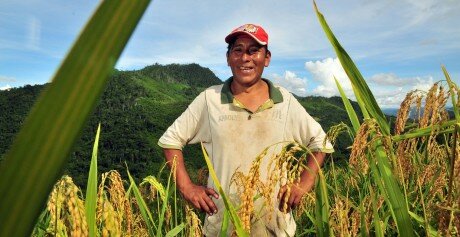Partners about scaling inclusive markets

The Seas of Change Initiative conducted a series of interviews with leading figures in the sector about ‘what works when scaling inclusive agri-food markets’. Results of the interviews have been used for the commodity research that can be found on the left side of this page. Interesting quotes from these interviews are shown below.
“The Seas of Change initiative will be a good opportunity to learn experiences across commodities, and to hear from traders (such as a head of procurement for instance) in terms of the challenges they face on a daily basis. It would be good if the Seas of change workshop could help getting the right messages across and defining coherent actions to best align the activities of development partners/NGOs, and industry representatives” (Stefanie Miltenburg, Director International Corporate Social Responsibility Sara Lee International b.v)
“Inclusiveness is not a cost but is part of our business value - A successful business model (e.g. inclusive outgrower schemes) depends on cultivating good relationships, transparency and a commitment to share equally the risks and rewards of the market” (Harry van Neer, Director of BusinessMinds, Africa Juice Founder)
“Ensuring sustainability requires to have a good exit strategies” (Jan Kees Vis, Global Director Sustainable Sourcing Development Unilever)
“There is an increasing willingness by the industry to solve the problems at a precompetitive level and to be part of the solution. In addition there is more and more the recognition that there is nothing wrong with achieving sustainability in business. On the contrary, there is a business case to achieve sustainability. Another positive development is that governments and donors would like to increasingly engage with the private sector to help sustainability go mainstream” (Peter van Grinsven, Cocoa Sustainability Director – Origin Operations Mars Nederland B.V.)
“Each actor has different roles and responsibilities. My message to NGOs and governments is to not distort the markets with grants to producers, in cases where there are market driven financial instruments available” (André Dellevoet, Executive Manager, Africa Enterprise Challenge Fund)
“Sustainability, unlike volume, is not a technical specification (the elements of our definition are challenged many times). It is crucial to increase awareness of the concept of sustainable sourcing. A wide understanding of it is not there yet” (Jan Kees Vis, Global Director Sustainable Sourcing Development Unilever)
“Our business is sustainable only if the cocoa sector is sustainable. We need a roadmap towards this goal” (MARS)
“If certification continues to reach only farmers working in cooperatives, it will not achieve the target of mainstream sustainability. Certification needs a critical mass to make it the new norm, to set a new benchmark” (Peter van Grinsven, Cocoa Sustainability Director – Origin Operations Mars Nederland B.V.)
“In our experience so far we recognise that while certification has brought a series of important benefits, there is need to go beyond certification. In most cases there are no clear targets in terms of income for farmers and quality. This needs to be improved. NGOs have a critical role to play, it is crucial to have them more involved and aligned with industry’s attempts to set up inclusive business” (Don Jansen Program Manager Douwe Egberts Foundation)
“It is crucial to get decision makers of the industry aligned on critical issues (such as meeting increasing demand in a context of supply constraints). Sometimes key issues are discussed and agreed at the level of corporate social responsibility, but do not get involvement and endorsement at higher level” (Stefanie Miltenburg, Director International Corporate Social Responsibility Sara Lee International b.v)
“The key challenge of going to scale is to improve monitoring and evaluation mechanisms to assess the actual impact. It is proving challenging to show a positive cost-benefit balance for farmers” (Jan Kees Vis, Global Director Sustainable Sourcing Development Unilever)





